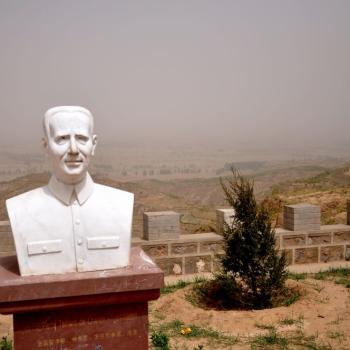
The Catholics in Media Awards will be given out this Sunday, March 29, 2009 at the Beverly Hills Hotel.

I had a wonderful opportunity to interview executive producers Greg Walker and Jan Nash who will be present to receive the award:
Sr. Rose: I have a friend who said that your show, from the very beginning reminded her of the Good Shepherd, looking for the lost ….
Greg Walker: Jan and I came on the show after the first episode and we have always operated from the premise of the characters looking to try to find a spiritual center (emotional/intellectual) on each episode…Our FBI guys deal with lost souls and need to bring them back into the fold….
We were always puzzled, or challenged, by who would do the job in terms of the FBI looking for the lost in each episode, and what would happen when they would lose, or get lost in their own lives.
And the premise for each episode is that Jack Malone (Anthony LaPaglia) is a “hope junkie.”
SR: We in CIMA have been talking about Without a Trace for years and in fact gave the show a commendation early on and it is always on our recommended list. But do you know which episode really decided us? “The Miracle Worker” on January 14, 2009.
GW: We thought it was that one! It was a special episode. The characters want good outcomes. This idea has guided how the agents exist within the show since the beginning. And even when the outcomes are not positive, that the story show that the loss will not have been in vain.
Jan [Nash], with her background in spirituality, well, she really is able to bring much depth to the stories. In the world of story-telling there are so many that can end in any way possible, but we strive to achieve a balance in our stories to let the audience go to sleep at 11:00pm!
SR: Jan, I am intrigued. Can you share with us something about your spiritual background?
Jan Nash: I am a big fan of God… a big, big fan…. I grew up in a Baptist household in Wheaton, IL. God, spirituality, has always been a big part of my life. Without a Trace is a terrific vehicle to inject spiritual questions into people’s daily life and work. We are interested in what really matters to people.
SR: Without a Trace is in its 7th season. What does this mean to you?
GW: Without a Trace is of those shows where you have the freedom to chart a personal journey for the missing person, and if it can center on a human and spiritual relationship it provides a framework for people, characters to strive to do what is right.
SR: Greg, what is your spiritual background?
GW: My perspective comes more from education about social justice. I went to Bellarmine, a Jesuit High School in Santa Jose, CA. My wife and children are Catholic as well. And this is important to us.
SR: So, what was your first reaction to learning of the Catholics in Media Award?
GW: If we had nominated an Emmy I wouldn’t have been as proud as seeing the letter in my inbox. There are a few priest teachers in Bellarmine High School in San Jose who will be happy to learn of this award! More than anything I am overwhelmed at receiving this award, this acknowledgement. It felt to me like the honor I was always seeking that I didn’t know existed.
JN: My first reaction was: An award? What for? Here we are in our 7th season, operating under the radar, doing jobs we enjoy which is a source of great satisfaction. So to me, winning this award is unexpected, delightful and it caught us by surprise.
SR: Going back to “Without a Trace” and to another episode from Season 2 with Hector Elizondo playing a priest, an episode I have never, ever been able to forget, you treat the themes of spiritual darkness with such reverence and respect.
GW: Jan wrote that episode called “Revelations” in Season 2 and it’s great that you remember it so well. But going back to “The Miracle Worker”, when we, with the director Paul McCrane, and the team of writers, can access big emotions early on, and here it was about ten minutes in when the first emotional break happens in the montage of people praying, it can turn out really well.
And our FBI agents do make fun of the weeping statue at the beginning. But at the end, when Jack brings his prayer on a little piece of paper and tucks it under the statue, well, that was a strong emotional moment.
JN: TV is a lot of people rowing in the same direction, and when they do, you get some great stories.. The idea for “The Miracle Worker” came from one of our staff writers. We have nine other colleagues who write and figure out how this episode – and all of them – work.
GW: It takes a long, long time; you need to have a lot of people in the room. This episode went through at least ten different incarnations before it was finished. The director gets a lot of the credit.
JN: One of the other great things about being in TV is that there is a short time between writing and producing the show and it being on TV, and it is there week in and week out and is a show that people watch. Well, this gives us a lot of satisfaction as story-tellers. We hear stories about how people respond so positively to the show and we get a lot of validation when this happens.












